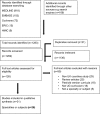Do we need a core curriculum for medical students? A scoping review
- PMID: 31473611
- PMCID: PMC6720253
- DOI: 10.1136/bmjopen-2018-027369
Do we need a core curriculum for medical students? A scoping review
Abstract
Objective: The General Medical Council (GMC) recommends medical schools to develop and implement curricula enabling students to achieve the required learning outcomes. UK medical schools follow the GMC's Outcomes for graduates, which are generic. GMC plans to introduce a national Medical Licensing Assessment (MLA) for the medical graduates wanting to practise medicine in the UK in 2022. With no standardised or unified undergraduate (UG) curriculum in UK, various specialties have expressed concerns about not being represented in medical schools and developed specialty-specific core curricula. The aim of this review was to identify learned bodies who have developed a core curriculum for UK medical schools and highlight the drivers, gaps and future approaches to curricular development and implementation.
Methods: A literature search was conducted using online databases (EMBASE, MEDLINE, ERIC, HMIC, PubMed and CDSR), search engines and related websites (Google and Google Scholar, Department of Health, GMC and BMA) for relevant articles from 1996 to 5 March 2019 (~20 years). A methodological framework to map the key concepts of UG medical curriculum was followed. Any relevant body with a core curriculum for UK medical UGs was included.
Results: A total of 1283 articles were analysed with 31 articles included in the qualitative synthesis, comprising 26 specialties (clinical n=18, foundation subjects n=4 and professionalism related n=4). WHO, European and national (eg, Royal Colleges of UK) specialty bodies provided specific core learning outcomes for the medical graduates. Patient safety, disease burden, needs of society and inadequate preparedness of medical graduates were drivers for the development of these curricula.
Conclusions: This is the first comprehensive review of literature on UG core curricula recommending minimum standards on knowledge and skills, in alignment with GMC's Outcomes for graduates for all the UK medical students. Adopting and assessing unified standards would help reduce variability across UK medical schools for both generic and specialty-specific competencies.
Keywords: core; curriculum; medical education and training; undergraduate; united kingdom.
© Author(s) (or their employer(s)) 2019. Re-use permitted under CC BY. Published by BMJ.
Conflict of interest statement
Competing interests: None declared.
Figures
Similar articles
-
Barriers and facilitators for implementation of a national recommended specialty core-curriculum across UK medical schools: a cross-sectional study using an online questionnaire.BMJ Open. 2022 Mar 29;12(3):e053565. doi: 10.1136/bmjopen-2021-053565. BMJ Open. 2022. PMID: 35351703 Free PMC article.
-
Medical ethics and law for doctors of tomorrow: the 1998 Consensus Statement updated.J Med Ethics. 2010 Jan;36(1):55-60. doi: 10.1136/jme.2009.034660. J Med Ethics. 2010. PMID: 20026695
-
Exploring conceptual and theoretical frameworks for nurse practitioner education: a scoping review protocol.JBI Database System Rev Implement Rep. 2015 Oct;13(10):146-55. doi: 10.11124/jbisrir-2015-2150. JBI Database System Rev Implement Rep. 2015. PMID: 26571290
-
Undergraduate medical curricula: are students being trained to meet future service needs?Clin Med (Lond). 2003 May-Jun;3(3):243-6. doi: 10.7861/clinmedicine.3-3-243. Clin Med (Lond). 2003. PMID: 12848259 Free PMC article. Review.
-
Does the UK undergraduate medical curriculum prepare students in Oral and Maxillofacial Surgery? A scoping review.Br J Oral Maxillofac Surg. 2020 Dec;58(10):1229-1234. doi: 10.1016/j.bjoms.2020.06.005. Epub 2020 Jul 24. Br J Oral Maxillofac Surg. 2020. PMID: 32718749
Cited by
-
Student perceptions of handover diaries and reflective learning in an undergraduate MBChB anatomy course.MedEdPublish (2016). 2023 Dec 5;13:305. doi: 10.12688/mep.19946.1. eCollection 2023. MedEdPublish (2016). 2023. PMID: 39258267 Free PMC article.
-
Approaching an undergraduate medical curriculum map: challenges and expectations.BMC Med Educ. 2021 Jun 10;21(1):341. doi: 10.1186/s12909-021-02778-6. BMC Med Educ. 2021. PMID: 34112162 Free PMC article.
-
Barriers and facilitators for implementation of a national recommended specialty core-curriculum across UK medical schools: a cross-sectional study using an online questionnaire.BMJ Open. 2022 Mar 29;12(3):e053565. doi: 10.1136/bmjopen-2021-053565. BMJ Open. 2022. PMID: 35351703 Free PMC article.
-
Updating the British Geriatrics Society recommended undergraduate curriculum in geriatric medicine: a curriculum mapping and nominal group technique study.Age Ageing. 2023 Feb 1;52(2):afac325. doi: 10.1093/ageing/afac325. Age Ageing. 2023. PMID: 36746388 Free PMC article.
-
The need for non-technical skills education in orthopedic surgery.BMC Med Educ. 2023 Apr 19;23(1):262. doi: 10.1186/s12909-023-04196-2. BMC Med Educ. 2023. PMID: 37076848 Free PMC article.
References
-
- Manchester Promoting excellence: standards for medical education and training, 2015. Available: https://www.gmc-uk.org/-/media/documents/Promoting_excellence_standards_... [Accessed 28 Sep 2018].
-
- Medical Licencing Assessment General medical Council, 2018. Available: https://www.gmc-uk.org/education/standards-guidance-and-curricula/projec... [Accessed 28 Sep 2018].
-
- Outcomes for graduates General medical Council, 2018. Available: https://www.gmc-uk.org/-/media/documents/dc11326-outcomes-for-graduates-... [Accessed 28 Sep 2018].
-
- Future Hospital: caring for medical patients , 2013. Available: https://www.rcplondon.ac.uk/projects/outputs/future-hospital-commission [Accessed 28 Sep 2018].
-
- Arksey H, O'Malley L. Scoping studies: towards a methodological framework. Int J Soc Res Methodol 2005;8:19–32. 10.1080/1364557032000119616 - DOI
Publication types
MeSH terms
LinkOut - more resources
Full Text Sources

